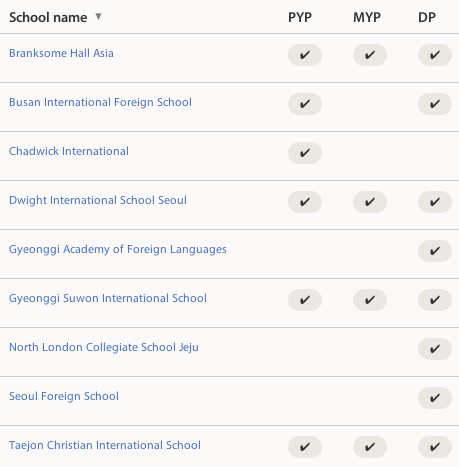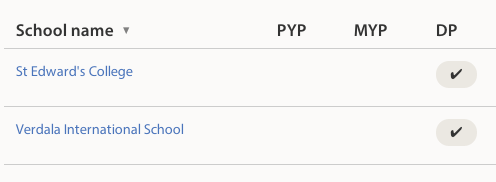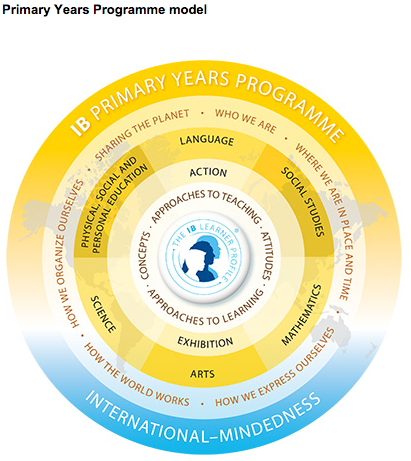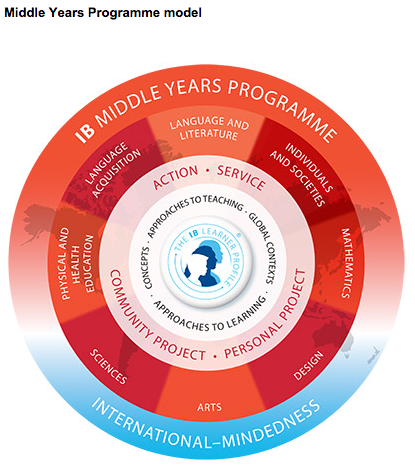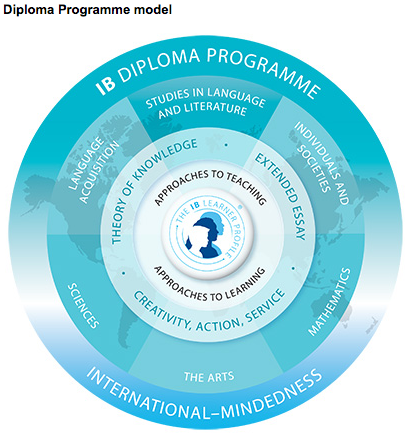국제 바칼로레아
위키백과, 우리 모두의 백과사전.
국제 바칼로레아(영어: International Baccalaureate, IB)는 1968년에 스위스 제네바를 기반으로 설립된 교육기관이다. 국제 바칼로레아는 3살부터 19살까지의 학생들에게 3가지의 교육 프로그램을 제공한다.
국제 바칼로레아의 교육 프로그램
IB 초등 교육 프로그램 (IB Primary Years Programme)
IB 중등 교육 프로그램 (IB Middle School Years Programme)
IB 디플로마 (Diploma Programme)
국제 바칼로레아 디플로마 프로그램/Diploma Programme
학생들이 흔히 말하는 IB(아이비)는 16살부터 19살까지의 학생들을 위한 국제 바칼로레아 디플로마 프로그램(International Baccalaureate Diploma Programme)을 말한다. 국제 바칼로레아 디플로마 프로그램은 2년에 걸쳐하는 고교과정이며 매년 5월과 11월에 수능과 같은 개념의 시험이 치러진다.
과목
학생들은 프로그램을 시작하기 전, 심화과정인 하이어 레벨 (Higher level) 3개와 기본과정인 스탠더드 레벨 (Standard level) 3개를 아래의 그룹들에서 하나씩 선택한다. 하이어 레벨을 네 개까지 고를 수 있다.
그룹 1: 언어 A1. 학생의 모국어. 국제 바칼로레아 디플로마 프로그램에서는 80여개의 언어가 제공된다.
그룹 2: 제 2 외국어. A2와 B로 두가지의 레벨이 제공된다. (2011년 9월부터 A2 과정은 사라지게 된다.)
그룹 3: 사회 과학. 비즈니스, 경제학, 지리학, 역사, 정보 과학, 이슬람 역사, 철학, 심리학, 인류학, 종교학
그룹 4: 자연 과학. 화학, 생물, 물리, 환경과학, 디자인 기술.
그룹 5: 수학. Mathematical Studies SL, Mathematics SL, Mathematics HL, 와 Further Mathematics SL로 네가지의 레벨이 제공된다.
그룹 6: 예술. 음악, 연극, 미술, 촬영, 무용. 학생들은 이 그룹에서는 예술과목을 택하지 않고 그룹 1~4의 과목중 하나를 추가로 택할 수 있다.
그 외, 학생들은 국제 바칼로레아 디플로마 프로그램을 수료하기 위해 다음 세개의 요건을 충족시킨다.
논문 (Extended Essay, EE): 학생들은 독자적인 연구와 추론을 통해 4000단어 미만의 에세이를 써서 제출한다.
Theory of Knowledge (TOK): 철학, 도덕, 논술 등을 통합하여 비판적이고 이성적인 사고를 가르치는 교육 과정. 100시간의 수업을 이수하고 1,200-1,600 단어의 에세이와 하나의 프레젠테이션을 완성한다.
봉사와 교외 활동 (Creativity Action Service, CAS): 학생들은 교과 과정에 포함되지 않은 새로운 것을 배우는 Creativity 50시간, 물리적인 운동을 하는 Action 50시간, 그리고 봉사하는 Service 50시간을 2년에 걸쳐 한다.
입시
국제 바칼로레아 디플로마는 75개국에 있는 2000개가 넘는 대학에서 인정해주고있다. 영국에서는 대학 지원시 전공을 공표할때 국제 바칼로레아 디플로마의 과목을 중시하며 입학을 허가할때에는 국제 바칼로레아 디플로마 시험에서 최소 몇점을 받아야된다는 조건을 제공한다. 미국의 경우 입시때는 국제 바칼로레아 디플로마가 크게 작용하지는 않지만, 하이어 과목에 한해서는 미국의 대학과목 선이수제 Advanced Placement(AP)와 동일한 취급을 해준다. 대한민국에서는 서울대학교와 KAIST, 연세대학교 등의 대학들이 해외에서 고교과정을 이수한 학생들의 입시 조건으로 인정해준다.
Countries with more than 40 schools teaching IB programmes. (as of 1 Dec 2014)| Country | Primary | Middle | Diploma | Schools |
|---|
| USA | 444 | 544 | 830 | 1,575 |
| Canada | 74 | 166 | 156 | 348 |
| Australia | 95 | 41 | 63 | 155 |
| Ecuador | 7 | 8 | 150 | 150 |
| United Kingdom | 13 | 12 | 134 | 142 |
| India | 51 | 11 | 100 | 113 |
| Mexico | 53 | 35 | 65 | 105 |
| China | 32 | 24 | 67 | 82 |
| Spain | 8 | 10 | 74 | 76 |
| Germany | 23 | 9 | 60 | 64 |
| Hong Kong | 29 | 9 | 29 | 53 |
| Turkey | 19 | 9 | 33 | 49 |
| Argentina | 7 | 2 | 47 | 48 |
| Switzerland | 18 | 11 | 41 | 48 |
| Indonesia | 28 | 13 | 26 | 44 |
| Poland | 6 | 7 | 37 | 42 |
| Total schools | 1,207 | 1,120 | 2,642 | 3,966 |
| Countries | 104 | 97 | 140 | 147 |
한국
한국에서 IB를 시행하는 학교들은 2014년 9개교입니다.
몰타
몰타에서 IB를 시행하는 학교들은 2014년 2개교입니다.
IB 프로그램 소개
From IBO Website
About the IB
Founded in 1968, the International Baccalaureate® (IB) is a non-profit educational foundation offering four highly respected programmes of international education that develop the intellectual, personal, emotional and social skills needed to live, learn and work in a rapidly globalizing world. Schools must be authorized, by the IB organization, to offer any of the programmes. To learn about the authorization process, visit our Become an IB World School section.
The International Baccalaureate, formerly known as The International Baccalaureate Organization (IBO), is an international educational foundation headquartered in Geneva, Switzerland founded in 1968. IB offers four educational programmes for children aged 3–19. The organisation's name and logo were changed in 2007 to reflect a reorganisation. Consequently, "IB" can refer to the organisation itself, any of the four programmes, or the diploma or certificates awarded at the end of the programme.
Marie-Thérèse Maurette created the framework for what would eventually become the IB Diploma Programme (IBDP) in 1948 when she wrote Is There a Way of Teaching for Peace?, a handbook for United Nationsite. In the mid-1960s, a group of teachers from the International School of Geneva (Ecolint) created the International Schools Examinations Syndicate (ISES), which would later become the International Baccalaureate (IB). by Peter Nehr, International Baccalaureate Africa, Europe and Middle-East (IBAEM) was established in 1986, and International Baccalaureate Asia Pacific (IBAP) established during the same period.
The IB Middle Years Programme (MYP) adheres to the study of eight subject areas and was developed and piloted in the mid-1990s. Within five years 51 countries had MYP schools. The IB Primary Years Programme (PYP) was piloted in 1996 in thirty primary schools on different continents, and the first PYP school was authorised in 1997, with as many as 87 authorised schools in 43 countries within five years. The newest offering from the IB, the IB Career-related Programme (formerly IB Career-related Certificate) is designed for students of ages 16 to 19 who want to engage in career-related learning. The IB introduced its newly reviewed MYP for first teaching in September 2014.
IB mission statement
The International Baccalaureate aims to develop inquiring, knowledgeable and caring young people who
help to create a better and more peaceful world through intercultural understanding and respect.
To this end the organization works with schools, governments and international organizations to develop
challenging programmes of international education and rigorous assessment.
These programmes encourage students across the world to become active, compassionate and lifelong
learners who understand that other people, with their differences, can also be right.
International Baccalaureate Organization (UK) Ltd
Peterson House, Malthouse Avenue, Cardiff Gate
Cardiff, Wales CF23 8GL
United Kingdom
Website: www.ibo.org

